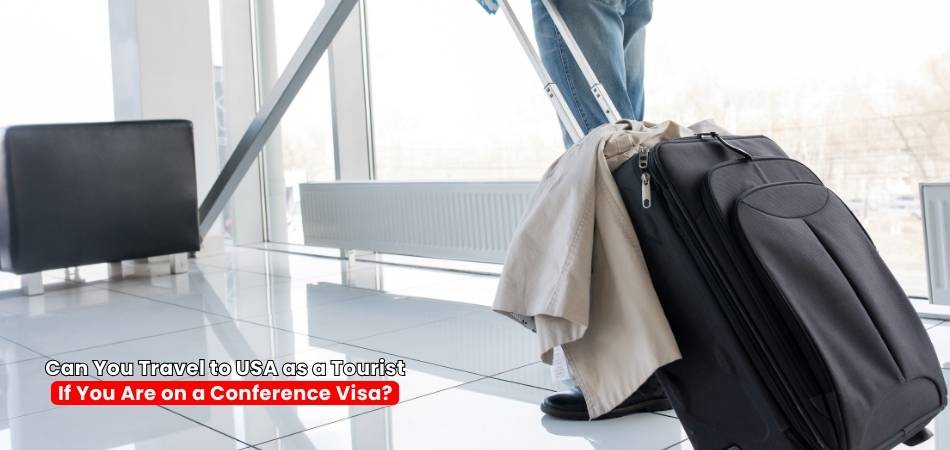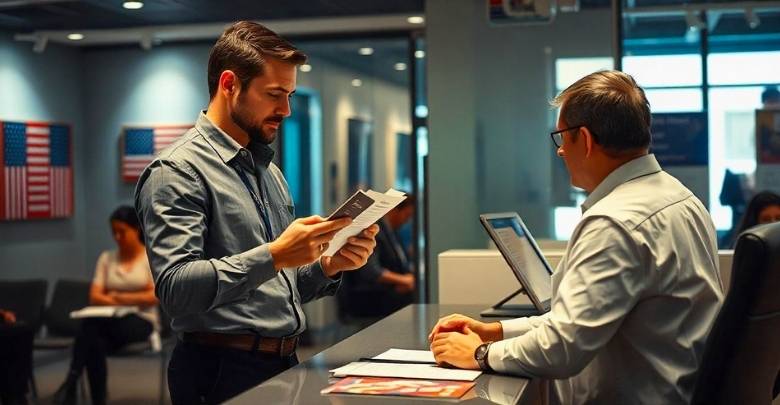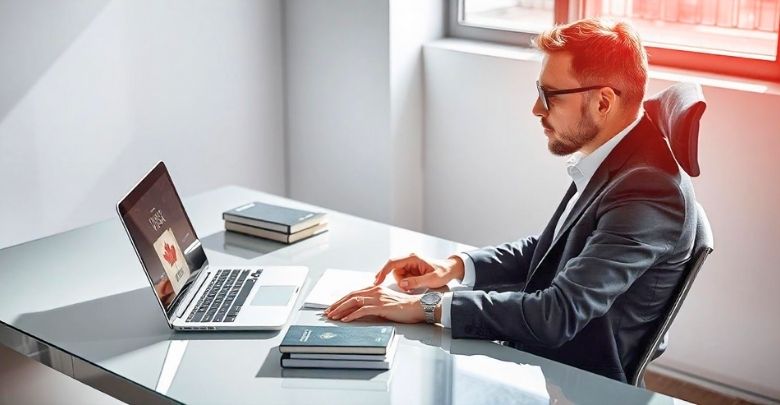Planning a trip to the USA on a conference visa involves knowing the rules and limits of this specific visa type. A conference visa is primarily issued for attending professional events such as meetings or seminars. However, you might wonder: Can you travel to USA as a tourist if you are on a conference visa?
Yes, you can travel to the United States as a tourist while attending a conference if you have a B-1 Business Visitor Visa or a B-2 Tourist Visa. The B-1/B-2 visa allows both business and leisure activities, but a B-1 only visa restricts tourism.
Are you curious about how to manage the rules or explore alternatives for combining business and leisure? Read on to discover key insights and actionable tips to stay within legal boundaries while planning your visit to the USA.
Can You Travel to USA as a Tourist if You Are on a Conference Visa?
When planning a trip to the USA on a conference visa, understanding its limits is crucial. Conference visas typically have a narrow purpose, and you need to know if tourism is permitted. Here are the key factors to consider when staying within legal boundaries.
Purpose of a Conference Visa
A conference visa, commonly a B-1 visa, is intended for attending professional events like meetings or seminars. This visa type strictly limits activities to business-related matters. Any attempt to use the visa for tourism, such as vacationing or sightseeing, could be viewed as a violation of its terms, leading to complications.
Tourism Restrictions on a Conference Visa
Traveling for pleasure may be prohibited with a B-1 visa, which is primarily intended for business travel. While you can explore the local area during downtime between conference sessions, extensive tourist activities beyond that can violate the visa’s terms, possibly affecting your future visa applications or US travel eligibility.
Understanding Dual Intent
The B-1/B-2 visa allows for both business and tourism purposes, which is known as dual intent. If you hold this combination visa, you can legally travel for both attending business events and engaging in tourism. Ensure that your visa supports these activities to avoid confusion or legal issues upon entry.
Checking Visa Annotations
Visa annotations indicate the specific purpose of your visa. A “conference only” annotation means your visa is strictly for attending a conference. If you plan to do tourist activities, ensure your visa permits such activities. Engaging in tourism without proper authorization could lead to a violation of US immigration laws.
Adhering to the Visa Validity Period
Conference visas come with a set validity period for your stay in the US. Whether you attend the conference or not, overstaying this period, even by a day, is illegal. If you plan to explore the US for tourism, ensure it aligns with your visa’s duration and apply for an extension if necessary.
Clarifying at Port of Entry
At the US border, immigration officers may ask about the nature of your visit. If you’re attending a conference and planning to travel for tourism afterwards, you should confirm that your visa allows such activities. If the visa is strictly for conferences, tourism may be restricted, and entry could be denied.
Legal Consequences of Misuse
If you misuse a conference visa for tourism, the consequences could be severe. This includes deportation, a revoked visa, or being banned from reentering the US. Misusing a visa can also result in long-term issues for future visa applications, which can affect your ability to visit the US again.
Exploring Alternatives for Tourism
If you are interested in tourism after a conference, apply for a separate B-2 tourist visa or check if you’re eligible for the Visa Waiver Program (ESTA). These options allow you to enjoy tourism legally. Make sure you do this before engaging in leisure activities to avoid violating visa terms.
Seek Advice from an Immigration Attorney
When in doubt about your visa’s restrictions, consulting an immigration attorney is a smart choice. They can provide guidance on how to balance business and tourism activities within the confines of the law, ensuring that you comply with all US immigration regulations during your stay.
Documenting Your Travel Plans
It’s wise to keep thorough records of your itinerary, including both the conference schedule and any planned tourism activities. This documentation can support your case if you’re questioned by immigration officers. Clear evidence of your intent helps ensure a smooth experience at US entry points and with future visa applications.
Staying compliant with visa regulations is essential for a hassle-free visit. If you plan to attend a conference in USA, ensure your visa permits related activities. Knowing restrictions helps avoid legal issues, ensuring a smooth and lawful travel experience.
What Are the Restrictions of a USA Conference Visa?
The USA conference visa, also known as the B-1 visa, allows individuals to enter the country for business-related activities. While it provides access to professional events, there are strict conditions that must be followed. Let’s take a closer look at the key restrictions to avoid any issues.
No Employment or Paid Work Allowed
A B-1 visa strictly prohibits employment in the U.S. Attendees can join conferences, meetings, and training sessions, but they cannot work or receive a salary from a U.S. company. Even freelance work for U.S. clients is not allowed. Engaging in any paid activity can result in visa cancellation, deportation, or bans on future entry to the U.S.
Limited Duration of Stay
The permitted stay on a B-1 visa is usually up to six months, but immigration officers determine the exact length upon entry. Staying beyond the approved period can lead to visa violations, fines, and possible deportation. Overstaying can also negatively impact future visa applications, making it harder to reenter the U.S. in the future.
No Academic Studies or Long-Term Training
A B-1 visa does not allow full-time academic studies or long-term training programs. While short workshops or seminars are permitted, enrolling in a degree program or extended training requires a student visa. Attending classes without proper authorization can result in visa revocation and removal from the U.S., affecting future visa eligibility.
Frequent Travel May Raise Concerns
Holding a valid B-1 visa does not guarantee automatic entry. If a visa holder visits too often or stays for extended periods, immigration officers may suspect misuse. They may ask for proof of event participation and strong ties to the home country. Repeated long stays without valid reasons can lead to entry denial or visa cancellation.
No Change of Status Without Approval
B-1 visa holders cannot change their visa status while in the U.S. unless they apply for and receive approval. Switching to another visa category, like a work or student visa, requires meeting strict requirements. Attempting to change status without permission can lead to visa violations, affecting future travel eligibility and legal standing in the U.S.
The USA conference visa comes with specific rules that must be followed to avoid legal issues. Staying within the permitted time, avoiding paid work, and following visa conditions will help ensure smooth travel. Knowing these restrictions is essential for maintaining a good travel record and avoiding complications in future visa applications.
Is It Possible to Switch From a Business Visa to a Tourist Visa for USA Conference?
Switching visa types while in the U.S. can be a complex process. Travelers often wonder if they can change their visa category to extend their stay or modify their purpose. Below are a few key points about switching from a business visa to a tourism visa for conferences.
Awareness of Visa Limitations
A business visa, or B-1 visa, allows temporary entry for business-related activities, such as conferences. However, it does not permit activities beyond its specific purpose. Switching to a tourist visa for leisure or tourism requires meeting strict legal conditions. In that case, knowing the difference between visitor and tourist visas can clarify why specific visa rules must be followed.
Eligibility for Changing Visa Status
To change your visa status while in the U.S., you must file Form I-539, Application to Extend/Change Nonimmigrant Status. The change must align with the original intent of your visit. If you plan to engage in tourism after attending the conference, the application should be submitted before your current visa expires.
Required Documentation
Switching from a B-1 business visa to a B-2 tourist visa requires submitting the necessary documents. This includes a valid passport, a detailed explanation of the reason for the change, proof of financial support, and evidence of plans to return to your home country. Complete documentation improves the chances of approval.
Processing Time and Approval Challenges
The processing time for a visa change can take several months. During this period, you must maintain lawful status in the U.S. Note that approval is not guaranteed. If your application is denied, you may need to leave the country to avoid violating immigration laws.
Alternative Options for Combining Business and Tourism
If you plan to combine business and tourism, consider applying for a B-1/B-2 visa, which allows both activities. This visa avoids the need for status changes and simplifies travel plans. If you already hold a B-1 visa, carefully review your eligibility and requirements before attempting to switch statuses.
Switching from a business visa to a tourism visa for attending a USA conference is possible but requires meeting specific criteria. Proper planning and documentation are key. By figuring out visa restrictions and filing on time, you can ensure compliance with U.S. immigration laws.
Can Breaking Visa Rules Affect Future USA Travel Eligibility for Conference?
Traveling to the USA for a conference is an exciting opportunity, but visa rules must be followed carefully. Many people ignore small details, thinking they don’t matter. However, even minor violations can cause big problems later. Knowing the consequences of breaking visa rules is important. Read on to know how it can affect your future travel plans.
Overstaying a Visa Can Lead to Travel Bans
If you stay beyond the allowed time on your visa, you could face serious consequences. Even a short overstay might lead to difficulties in getting a visa in the future. A longer overstay could result in a ban for several years. Immigration officers can see past violations, making it harder to enter the USA again.
Working on a Tourist or Conference Visa Is Not Allowed
A conference visa allows you to attend events, not to work or earn money. If you engage in any paid activity while on a visitor visa, you might be violating immigration laws. This can lead to visa cancellations, deportation, and being denied future entries. Always check what is allowed before doing any professional activity.
Providing False Information Can Get You Permanently Barred
Giving incorrect details on your visa application can have long-term effects. If officials find out that you lied about your travel history, reason for visiting, or any other information, they may deny your entry. In some cases, this could even lead to a permanent ban from entering the USA.
Repeated Violations Can Make Future Travel Very Difficult
If you break visa rules once, you might still get another chance. However, repeated violations show a pattern of non-compliance, which immigration officials take seriously. Multiple offenses can lead to strict questioning at the airport, visa rejections, and even being turned away at the border. It’s always best to follow the rules to avoid trouble.
Ignoring Visa Conditions Can Affect Other Travel Plans
Violating U.S. visa rules doesn’t just affect your ability to visit the USA. Many countries share immigration data, and a U.S. visa violation could make it harder to get visas for other places. This can limit your options for future academic events, professional meetings, and vacations.
Breaking visa rules may seem like a small issue at first, but the consequences can be serious. A simple mistake can lead to travel bans, visa rejections, and unnecessary stress. Always follow the regulations to ensure smooth future travel. Staying informed and careful is the best way to avoid problems.
How Can USA Conference Visa Holders Confirm Their Stay Duration Before Traveling?
Planning to attend a conference in the USA requires careful preparation, and knowing how long you can stay is essential. Overstaying can create problems for future travel. The best way to avoid issues is to understand your visa details before departure. Below are key ways to confirm your stay duration.
Check the Visa Stamp on Your Passport
Your visa stamp contains essential details like your visa type and expiration date. However, it does not guarantee how long you can stay in the USA. The final decision is made by the Customs and Border Protection (CBP) officer upon arrival. Always check if your visa is still valid and aligns with your planned travel dates before booking flights.
Review Your I-94 Arrival Record Online
The I-94 document officially records the duration of your stay in the USA. It is issued upon entry and can be accessed online using your passport details. This document shows the actual date by which you must leave. Reviewing it right after arrival is crucial to avoid any misunderstandings regarding your permitted stay duration.
Understand the Conference Visa Rules Clearly
Conference visas, typically B-1 or B-2, allow short-term visits for specific events. They do not permit long stays or work-related activities. If you are not sure about the details, checking conference visa status online can help confirm your stay limits before making travel plans. This helps ensure you do not accidentally overstay or engage in activities beyond your visa’s limitations.
Contact the U.S. Embassy or Consulate for Guidance
If you have doubts about your visa duration, the U.S. embassy or consulate in your country can provide official guidance. They can explain visa conditions, restrictions, and the maximum time you are allowed to stay. This is especially helpful if your travel plans are complex or if you need to confirm whether extensions or renewals are possible.
Clarify Stay Duration with the CBP Officer Upon Arrival
The CBP officer at the airport makes the final decision on how long you can stay. They will stamp your passport and update your I-94 record with the approved departure date. If you need clarification about your stay duration, politely ask the officer when they process your entry. Being informed at this stage helps avoid future travel issues.
Confirming your stay duration before traveling to the USA prevents unnecessary complications. Reviewing visa documents, checking official records, and asking the right authorities can help you stay within legal limits. A little preparation ensures a stress-free conference visit without unexpected immigration problems.
FAQs About Can You Travel to USA as a Tourist if You Are on a Conference Visa?
If you’re planning to visit the USA on a conference visa, understanding its restrictions and allowances is crucial. To help clarify common concerns, here are some frequently asked questions regarding conference visas and their limitations.
Can I Attend Multiple Conferences on a Single B-1 Visa?
Yes, you can attend multiple conferences within your visa’s validity. However, you must provide proof of each event if questioned at the border. Be mindful of your stay duration, as overstaying can lead to complications. Ensure all events align with the visa’s purpose and avoid unrelated activities that could violate its terms.
Can My Family Accompany Me on a Conference Visa?
No, the B-1 visa does not allow dependents to travel with you. If your family wishes to join you, they must apply for a B-2 tourist visa separately. They will need to provide travel plans, and financial support proof, and explain their visit purpose to immigration officers upon arrival in the USA.
Is It Possible to Extend My Conference Visa Stay?
Yes, you can apply for an extension by filing Form I-539 before your authorized stay expires. You must present a valid reason, such as attending another business-related event. Approval is not guaranteed, and staying beyond your permitted duration without authorization can result in visa revocation and future travel difficulties.
Do I Need a Separate Visa If My Conference Includes a Training Workshop?
If the workshop is strictly informational and part of the conference, you may attend on a B-1 visa. However, if it involves hands-on work, practical training, or direct employment, a different visa like the H-3 training visa may be required. Always confirm visa requirements before engaging in such activities.
Can I Visit Friends or Relatives While on a Conference Visa?
Yes, visiting friends or relatives is allowed, but your main purpose must remain business-related. Extensive personal travel may raise concerns with immigration officers. If asked, be prepared to explain your itinerary and ensure your stay duration aligns with the visa’s terms to avoid any legal complications.
Will Attending a Virtual Conference Affect My Future Visa Applications?
No, attending a virtual conference does not impact future visa applications. However, if you later apply for a B-1 visa, you must clearly demonstrate why attending in person is necessary. Providing event details, proof of participation, and an explanation of the professional benefits can strengthen your visa application.
Bottom Line
Traveling to the USA on a conference visa requires careful planning and becoming aware of its limitations. The visa allows you to attend business events like conferences, meetings, or training sessions, but it comes with specific rules. Knowing these regulations helps ensure a hassle-free and lawful visit, protecting your future travel eligibility.
For those wondering, can you travel to USA as a tourist if you are on a conference visa? Yes, you can travel to the United States as a tourist while attending a conference if you have the appropriate visa. A B-1 Business Visitor Visa is for conference-related activities, but if you wish to explore, a B-1/B-2 visa permits both business and leisure.
To make your trip enjoyable and stress-free, always double-check your visa conditions, plan your itinerary wisely, and keep proper documentation. If in doubt, seek professional advice to clarify uncertainties. Following these tips will keep your travel smooth and safe. Wishing you a successful conference and a wonderful experience in the USA.








